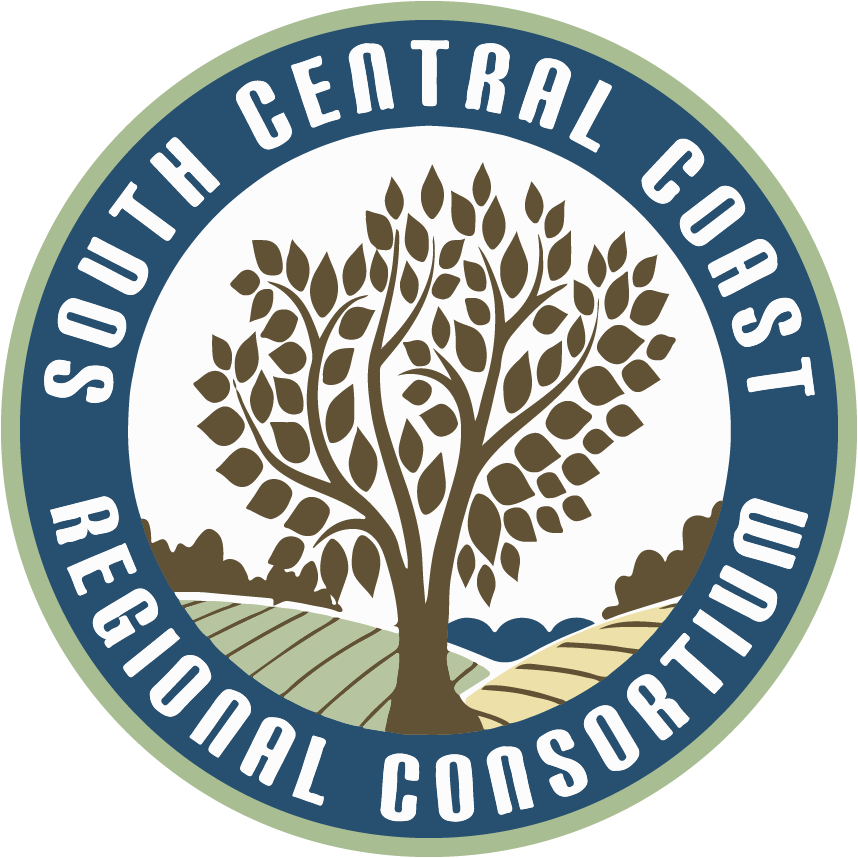Resources
The South Central Coast Regional Consortium (SCCRC) serves to facilitate and promote effective regional educational initiatives for its member colleges and key stakeholders in support of local, regional, and statewide workforce development efforts. We leverage employer, community, and educational resources to create and maintain a highly skilled workforce that meets our regional needs.
Please contact us if there is anything else that you need.
Regional Collaboration & Coordination (RCC) Employer Engagement
This funding opportunity to California Community Colleges is for a host district/college in each region to provide Regional Collaboration and Coordination (RCC), working with the colleges and key stakeholders in the regional workforce and economic development ecosystem to help drive:
- Collaboration and coordination of career education programs among colleges in each identified region;
- Regional strategies to reduce employment and equity gaps; Page 7 of 28 June 2021 Regional Collaboration and Coordination Grant
- Capture and dissemination of valuable, region-specific employer, industry, and student success data;
- Develop strategies and structures that provide comprehensive supports to serve part-time and adult learners; and
- Evolution of current regional governance structures and employer engagement functions that are much more inclusive.
The host district/college in each region will support a regional team that will work to coordinate, collaborate, organize, and facilitate interaction in the region to ensure workforce training is provided to all in a way that is accessible, efficient, responsive, data-driven and improves outcomes.
These efforts will be measured by the following outcomes:
i. The expansion of work-based learning for all students;
ii. The increase of student employment outcomes; and
iii. The responsiveness of colleges to the training needs of employers.
Adult Education
California Adult Education Programs (CAEP) throughout the South Central Coast Region concentrate on the different and changing educational needs of adults, and the region’s programs include both K12 Adult Schools and community college noncredit. Their goal is to work closely with workforce and education partners, community stakeholders, and industry to ensure adult students are prepared for life, for work, and to support their families no matter where they are in their educational journey.
The SCCRC holds bi-annual meetings where best practices are shared, relevant presentations and data are explored and discussed, and relationships are built and sustained. Importantly, the SCCRC seeks to strengthen the transition between CAEP career education and workforce readiness students to community college credit programs and/or direct entry into the workforce.
Centers of Excellence
As grant-funded technical assistance providers, the eight Centers of Excellence (COE) across the state (located strategically to study the regional economies of California) support the community colleges by providing customized data on high growth, emerging, and economically-critical industries and occupations and their related workforce needs.
Contract Education
The purpose of this resource is to provide some basic information about Contract Education and some Tools and Templates that can be used by the community college contract education professional. These tools and samples were accumulated through contributions from community college practitioners, taken from Education Code, or developed for working with college programs.
Dual Enrollment
“Students who participate in high-quality dual enrollment programs are more likely to graduate high school, enter college, and persist in college to completion, according to national research. Students who are most likely to benefit are those who are most underrepresented in higher education in California: young men of color, students from low-income families, and first-generation college students. Dual enrollment is a powerful tool for equity.” (Career Ladders)
Dr. Giselle Bice, K14 Technical Assistance Provider
Giselle can guide you to the dual enrollment professionals at each college in the region.
(661) 362-3113 Giselle.Bice@canyons.edu
With support from the College Futures Foundation, and in collaboration with JFF, Career Ladders Project researched the landscape for dual enrollment in California. We produced recommendations for how to help more colleges, K-12 districts, and students across California reap the clear benefits of dual enrollment. CLP interviewed practitioners, researchers, and students at 48 of California’s 114 community colleges – and conducted in-depth research at six. Here are the results:
- The Dual Enrollment Landscape in California: A CLP Working Paper
- Dual Enrollment overview (1 page) and three brief case studies (Reedley College, Norco College, and East LA College)
- Dual Enrollment case study (Bakersfield College)
- Dual Enrollment in California: A JFF Working Paper
- Unlocking Potential – joint brief by CLP and JFF
- Dual Enrollment Toolkit — for Community Colleges and School District Partners
- High School to College Transition Tools
Guided Pathways
The Guided Pathways framework creates a highly structured approach to student success that provides all students with a set of clear course-taking patterns that promotes better enrollment decisions and prepares students for future success. The Guided Pathways framework also integrates support services in ways that make it easier for students to get the help they need during every step of their community college experience.
The Guided Pathways Implementation Team is a group of regional coordinators dedicated to supporting California community colleges and districts in their implementation of the Guided Pathways framework. We provide equity minded, student-centered, tailored coaching to help faculty, staff, and administrators across the California’s Community College system to improve student success. We foster relationships to build capacity, facilitate connections, disseminate resources and tools, and elevate best practices in order to catalyze the development and scale of innovative, high-impact student success strategies.
Contact your GPRC for an invitation to the South Central Coast Guided Pathways Community of Practice which takes place once a month on Tuesdays from 2:30-4pm. Upcoming Community of Practice meetings dates for the spring 2023 term include February 7, March 7, and April 4. In the meantime, be sure to check out our Greater Los Angeles Resource Guide and the GLA YouTube Channel for access to key resources and updates.
Regional Coordinators

Brandy Thomas (She/Her/Sis)

Antonio Ramirez (He/Him)

Lesley Bonds (She/Her)

In 2019, The California Workforce Pathways Joint Advisory Committee developed the Federal Perkins V State Plan which identified a wide-ranging effort to create a world-class CTE system that can strengthen education and workforce preparation available to all Californians.
May 2025 Update: The Chancellor’s Office, Workforce and Economic Development Division is pleased to share the newly released California Postsecondary Perkins V Monitoring and Technical Assistance Manual. This manual provides essential guidance for the effective administration of Perkins V funding across our community colleges.
The Strengthening Career and Technical Education for the 21st Century Act (Perkins V) was signed into law on July 31, 2018. The law reauthorizes and updates the Carl D. Perkins Career and Technical Education Act of 2006 to ensure career and technical education (CTE) programs meet the demands of the twenty-first-century economy. Perkins V represents an important opportunity to expand opportunities for every student to explore, choose, and follow career and technical education programs of study and career pathways to earn credentials of value.
- What the California Community Colleges Need to Know for Year Three of Perkins V (March 4, 2022, 9am-12pm)



